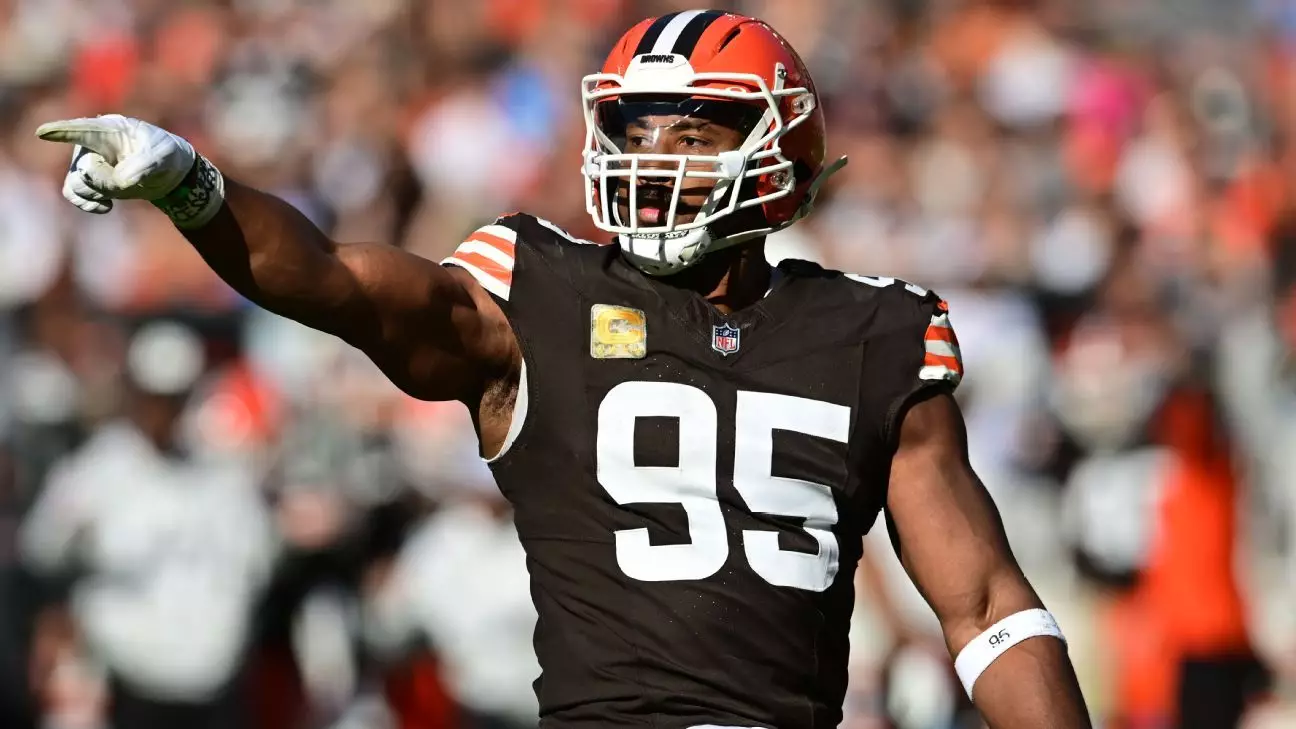In an unexpected turn of events for the Cleveland Browns, star defensive end Myles Garrett, the NFL’s reigning Defensive Player of the Year, has announced his desire to seek a trade away from the team. This move sends ripples through the fanbase and the league, as Garrett has been a cornerstone of the Browns’ defense since being selected first overall in the 2017 draft. His statement, announcing his intention to pursue other opportunities, reflects a growing frustration with the team’s prolonged failure to compete effectively in the NFL. “While I’ve loved calling this city my home,” Garrett articulated, “my desire to win and compete on the biggest stages won’t allow me to be complacent.” This sentiment clearly resonates with players who are eager to claim a spot on the grand stage of the Super Bowl.
Garrett’s recent comments underscore a critical juncture for both the player and the franchise. Speculation regarding his future started to intensify after a dismal 3-14 season, where veteran leadership was supposed to guide the team but, instead, led to further confusion. The defensive end’s call for clarity concerning the Browns’ offseason plans reflects a common theme in sports: the importance of vision and direction, especially for a player of his caliber. He is not merely looking for a paycheck but is actively seeking the potential for glory.
The Browns find themselves in a painful cycle of rebuilding that has plagued the franchise for years. Known for its numerous coaching changes and inconsistent performance, Cleveland has struggled to establish itself as a contender in the NFL, leading to Garrett’s proclaimed discontent. “I do not want to go through another rebuild in Cleveland,” he stated emphatically, underscoring his exhaustion with the franchise’s lack of progress. Additionally, with the second overall pick in the upcoming 2025 NFL draft, the team’s future direction remains uncertain.
Garrett’s frustrations stem not only from current performance but also from a historical context. Having experienced six losing seasons since joining the league, he asserts that the 2024 season stands out as particularly disappointing, even more so than his rookie year when the team recorded an infamous 0-16 record. Such a declaration illustrates the depth of his disappointment and may signal a need for the franchise to reassess its approach to team development.
In light of Garrett’s trade request, the Browns management has been steadfast in their position. General Manager Andrew Berry has publicly stated that he intends to keep Garrett on the roster, even going so far as to dismiss trade offers, which raises essential questions regarding negotiation strategies as the situation develops. Berry’s comments, including a vow that Garrett “will have a direct ticket from Cleveland to Canton,” allude to a vision of loyalty and legacy that the organization hopes to cultivate. However, such assurances may feel hollow to Garrett and his supporters if no tangible progress materializes.
As discussions continue, Garrett’s talent looms large over the franchise’s future. His record-breaking achievement of being the first player to reach 100 career sacks before his 29th birthday illustrates his prowess on the field and a potential path to securing a Hall of Fame career. However, with his current contract featuring only two years remaining, and no further guaranteed earnings, the need for clarity on both sides is pressing.
For Cleveland’s fans, the perspectives surrounding Garrett’s trade request evoke a mix of anxiety and hope. Many recognize Garrett as a rare talent within a historically troubled franchise, but a multitude of question marks hover over the team’s direction. Will the Browns heed his concerns and take meaningful action, or will they stand firm, thinking that their star player will ultimately conform to the organization’s wants?
This moment is crucial for both Garrett and the Cleveland Browns. As teams situate themselves along the paradigm of championship aspirations, the balance between nurturing homegrown talent and achieving immediate success becomes paramount. Whether Garrett remains in Cleveland or moves on to a new opportunity, the implications of this decision could resonate throughout the league, illustrating the ongoing challenge of building a winning culture in professional sports.

